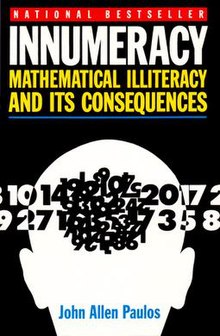Innumeracy (book)

Hardcover of Innumeracy: Mathematical Illiteracy and its Consequences
|
|
| Author | John Allen Paulos |
|---|---|
| Subject | Mathematics |
| Publisher | Hill and Wang; |
|
Publication date
|
1988 |
| Pages | 135 |
| ISBN | |
| Website | johnallenpaulos.com |
Innumeracy: Mathematical Illiteracy and its Consequences is a 1988 book by mathematician John Allen Paulos about "innumeracy," a term he embraced to describe the mathematical equivalent of illiteracy: incompetence with numbers rather than words. Innumeracy is a problem with many otherwise educated and knowledgeable people. While many people would be ashamed to admit they are illiterate, there is very little shame in saying "I'm a people person, not a numbers person." Or "I always hated math".
Paulos speaks mainly of the common misconceptions in regard to numbers. He looks at real-world examples in stock scams, psychics, astrology, sports records, elections, sex discrimination, UFOs, insurance and law, lotteries and drug testing. Paulos discusses innumeracy with quirky anecdotes, scenarios and facts, encouraging readers in the end to look at their world in a more quantitative way. The book sheds light on the link between innumeracy and pseudoscience. For example, the fortune telling psychic's few correct and general observations are remembered over the many incorrect guesses. He also stresses the problem between the actual number of occurrences of various risks and popular perceptions of those risks happening. The problems of innumeracy come at a great cost to society. Topics include probability and coincidence, innumeracy in pseudoscience, statistics and trade-offs in society. For example, the danger of getting killed in a car accident is much greater than terrorism and this danger should be reflected in how we allocate our limited resources.
John Allen Paulos (born July 4, 1945) is an American professor of mathematics at Temple University in Pennsylvania. He is a writer and speaker on mathematics and the importance of mathematical literacy. Paulos writes about many subjects, especially of the dangers of mathematical innumeracy; that is, the layperson's misconceptions about numbers, probability and logic. He has received awards in: 2013 JPBM (Joint Policy Board for Mathematics) Award for Communicating Mathematics on a Sustained Basis to Large Audiences. 2003 AAAS (American Association for the Advancement of Science) Award for Promoting the Public Understanding of Science and Technology.
...
Wikipedia
